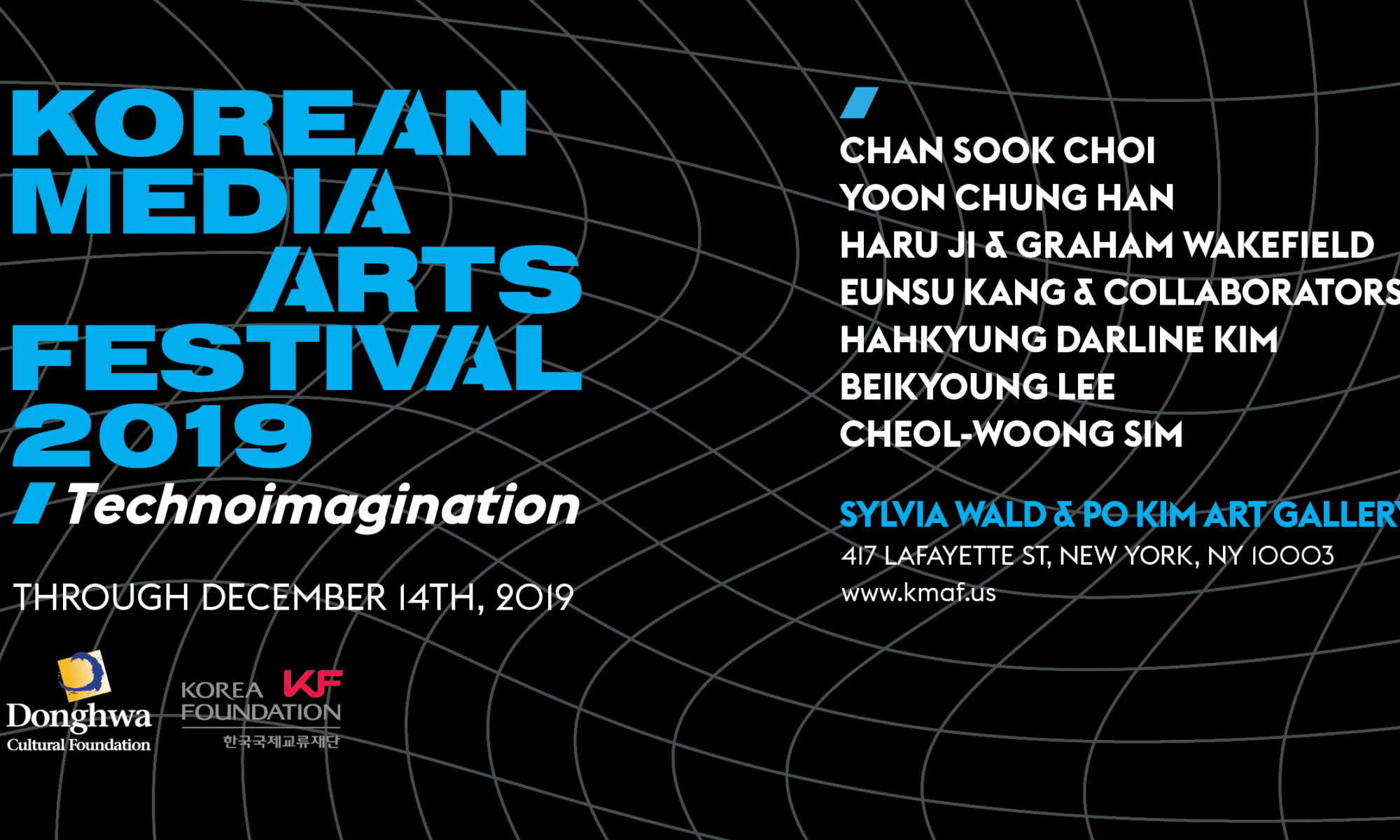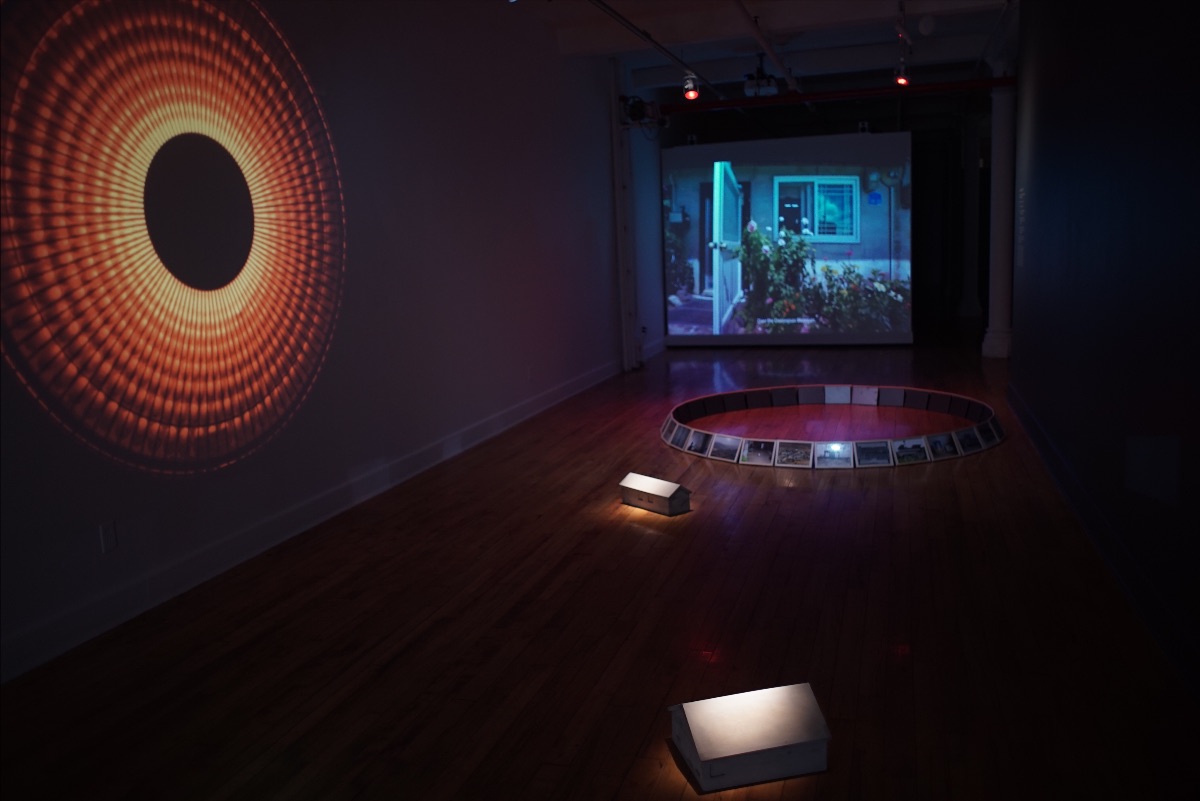Korean Media Arts Festival: Technoimagination
Chan Sook Choi, Yoon Chung Han, Haru Ji and Graham Wakefield Eunsu Kang and collaborators, Hahkyung Darline Kim, Beikyoung Lee, Cheol-Woong Sim
August 8, 2019 — December 14, 2019
The Korean Media Arts Festival (KMAF) aims to present the broadening intersection of art and technology through interactive and data-driven new media installations in 21st century Korean media art ensuing the era of Nam June Paik. The theme of the 2019 edition of KMAF, Technoimagination, as coined by the late media philosopher Vilém Flusser, refers to the technical image culture made possible by the advent of post-text cultural apparatuses such as cameras, televisions, computers and cable networks.
Technoimagination introduces New York to the unique situation and characteristics of media art in South Korea, as a leader of IT in the post-media and post-digital contemporary art era. The media artists presented here engage with this new sociocultural change as they create technological forms as the apparat-operator. The techno code is a new zero-dimensional plane code that combines dotted text with pictures, where time and space cannot be separated as with linear history. Here, space is experienced as synchronized time while time is experienced as diachronized space.
Technoimagination will be presented in two exhibition sub-themes: Memories in Time and Space and Living Data. The seven artists presented in Technoimagination cross the boundary between history and post-history in the context of technoimagination, while creating a new paradigm of space-time at the intersection of art and science.
Memories in Time and Space
The exhibition Memories in Time and Space is presented in two parts across both the 4th and 5th floor galleries. On the 4th floor, Memories in Time and Space I features works by Cheol-Woong Sim , Chan Sook Choi, and Hahkyung Darline Kim, in which the artists reveal the story of the modernization of Korea—with its distortions, lost identities of evicted migrants, and forgotten memories of marginalized groups during the War.
Cheol-Woong Sim, through his interactive installation, exposes the historical distortions and propaganda latent in the English Almanac of the Chosen Government General. Chan Sook Choi reflects on the narrative of the displaced migrants of the village of Yangjiri, a community built for propagandistic purposes towards North Korea. Hahkyung Darline Kim reveals the lost memories of those marginalized during the Korean War. These memories of the past fluctuate between history and post-history as the viewer experiences them within the space-time of technoimagination.
On the 5th floor, a different Memories in Time and Space II is presented. Beikyoung Lee’s Thoughtful Space brings the viewer into the abstract and transcendental space-time between actual and virtual realities. In transcendental space-time, sensory memories extend the limitations of the world in which we exist.
Living Data
Ever since the advent of the internet, an influx of data has become available from a variety of sources. As an era of Big Data has dawned upon us, the amount of unstructured data and the methods of its analysis have greatly increased, thereby intensifying the imperative to know the types of data to extract and filter, today a common interest in all fields including the arts.
Living Data presents data based works by Haru Ji & Graham Wakefield, Yoon Chung Han, and Eunsu Kang and collaborators. As artists and educators who have combined art and data in the labs of universities, they explore post-information age themes including the ethical issues in artificial intelligence, the privacy of biometric data, and the living systems of virtual environments.
Haru Ji & Graham Wakefield’s Infranet employs an artificial life agent with an evolutionary neural network that transforms urban infrastructural data into a virtual artificial ecosystem. Eyes by Yoon Chung Han utilizes biometric data to transform iris patterns into an interactive installation of musical sound and 3D-animated images. Eunsu Kang’s Aural Fauna presents an unknown organism form, called aural fauna, that enigmatically reacts to visitors’ sound and touch.
The three works presented in Living Data expand the boundaries of creative expression through their visualization of analyzed data, revealing a data-dependent artistic communication relevant to contemporary society’s data dependency.
Technoimagination: Memories in Time and Space and Technoimagination: Living Data have been co-curated by Odelette Cho of SWPK and Kyung Ran Joo of FUSE Art Project. The 2019 Korean Media Arts Festival is organized by the Donghwa Cultural Foundation, sponsored by the Korea Foundation, and presented in collaboration with SWPK and Harvestworks.









